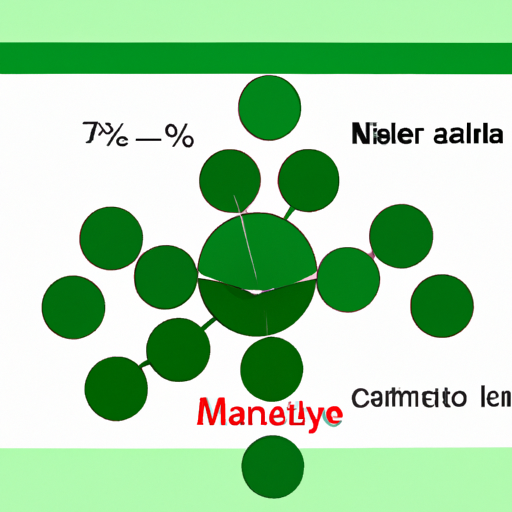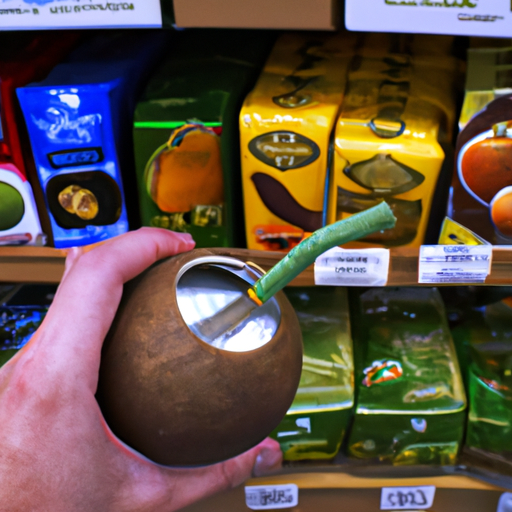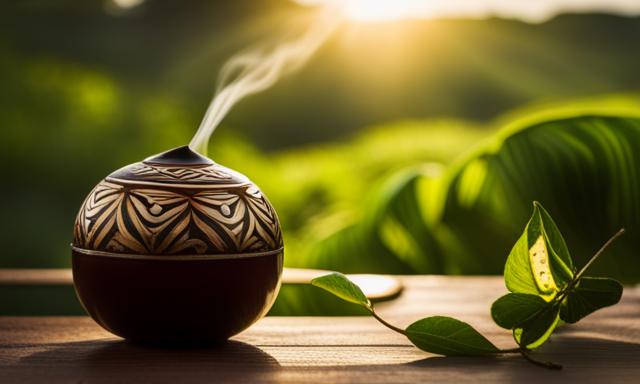As an individual constantly in search of natural caffeine alternatives, my curiosity was piqued by yerba mate and its amount of caffeine. Yerba mate, a favored tea in South America with centuries of tradition, comes from the leaves of the yerba mate bush. It’s distinguished by its distinctive flavor and capacity to invigorate.
In this article, we will explore how many milligrams of caffeine are in yerba mate, compare it to other caffeinated beverages, discuss its potential health benefits and side effects, and provide tips on how to choose the best quality yerba mate.
Whether you’re looking to add more variety to your caffeine intake or simply curious about this traditional beverage, read on to discover everything you need to know about yerba mate’s caffeine content.
Key Takeaways
- Yerba mate contains caffeine, but the amount varies and is balanced out by theobromine and theophylline.
- Premium yerba mate has significantly more caffeine content than low-quality varieties.
- Excessive intake of yerba mate and caffeine may lead to negative side effects.
- Yerba mate is a good option for those with anxiety due to its low caffeine content and natural compounds that promote relaxation and mental alertness.
What is Yerba Mate?
Yerba Mate is a South American beverage that’s gained popularity in recent years because of its unique flavor and potential health benefits. It’s made by steeping the leaves and twigs of the yerba mate plant in hot water, much like tea.
Yerba Mate has a long history and deep cultural significance among indigenous peoples in South America. In traditional medicine, it’s been used for centuries to treat a variety of ailments. Its caffeine content provides an energy boost, while its high antioxidant levels have been shown to reduce inflammation and improve heart health. Additionally, it contains other beneficial compounds such as theobromine and theophylline which can help stimulate mental clarity.
Now let’s talk about caffeine content in yerba mate. While it does contain caffeine, the amount can vary depending on how it’s prepared and consumed. Some estimates suggest that a typical serving of yerba mate contains around 30-50mg of caffeine per cup, which is less than coffee but more than tea.
Caffeine Content in Yerba Mate
You might be surprised to learn that this South American beverage can give you a boost of energy, similar to coffee or tea. Yerba mate is made from the leaves of an evergreen tree, which is grown and processed in countries such as Argentina, Brazil, and Paraguay. The plant requires a specific climate for cultivation it thrives in subtropical regions where there is plenty of rainfall and sunlight.
If you’re looking for a caffeine fix but are sensitive to its effects, yerba mate might be worth considering. Here are three things to keep in mind about its caffeine content:
-
On average, a cup of yerba mate contains around 30-50mg of caffeine less than coffee but more than most types of tea.
-
However, some brands may have higher levels depending on how they are prepared or blended with other ingredients.
-
Another factor to consider is your own caffeine sensitivity: some people may feel more energized after drinking yerba mate compared to others.
As we’ve seen, yerba mate has moderate amounts of caffeine and may provide an alternative for those who want something different from traditional coffee or tea. In the next section, we’ll compare how it stacks up against other popular caffeinated beverages on the market today.
Comparison to Other Caffeinated Beverages
If you’re tired of the same old coffee or tea routine, it’s worth exploring how yerba mate stacks up against other popular caffeinated beverages on the market today.
When compared to coffee, yerba mate contains less caffeine per serving. A typical cup of coffee has around 95mg of caffeine, while a cup of yerba mate has about 30-50mg. However, what sets yerba mate apart is that its caffeine content is balanced out by other compounds like theobromine and theophylline that give drinkers a more sustained energy boost.
Yerba mate also differs significantly from energy drinks in terms of its caffeine content. While energy drinks can pack as much as 160mg of caffeine per serving, they also contain high amounts of sugar and artificial additives which can lead to negative health effects like headaches and jitters. Yerba mate, on the other hand, has no added sugars or artificial ingredients and provides a more natural source of caffeine that won’t leave you crashing later on.
When comparing yerba mate to other caffeinated beverages like coffee and energy drinks, it’s clear that it offers a unique combination of natural compounds that provide sustained energy without negative side effects. In fact, research has suggested that drinking yerba mate may even offer additional health benefits beyond just an energy boost.
Health Benefits of Yerba Mate
Get ready to discover the various health benefits that come with enjoying a cup of this South American beverage. Yerba mate has been consumed for centuries and is known for its numerous medicinal properties. Not only does it provide an energy boost, but it also contains antioxidants, vitamins, and minerals that contribute to overall well-being.
Yerba mate has been found to have a positive effect on immunity. It contains compounds that stimulate the immune system and help fight off infections. Additionally, yerba mate has anti-inflammatory properties which can help reduce inflammation in the body, thereby improving overall health.
Another benefit of yerba mate is its positive effect on digestion. The beverage contains compounds that aid in digestion and can alleviate gastrointestinal problems such as bloating or constipation. Consuming yerba mate after meals can help regulate bowel movements and improve nutrient absorption.
While there are many potential benefits to drinking yerba mate, it’s important to note that there may be some side effects as well. In the next section, we will explore these potential side effects in more detail.
Potential Side Effects
Be aware of the potential downsides to consuming yerba mate, as there are some side effects that you may want to consider before making it a regular part of your diet. While yerba mate is generally considered safe for most people when consumed in moderate amounts, excessive intake can lead to negative effects on health.
Here are three potential side effects of consuming too much yerba mate:
-
Increased risk of certain cancers: Long-term consumption of yerba mate has been linked to an increased risk of developing certain types of cancer, including esophageal and bladder cancer.
-
Digestive problems: Yerba mate contains caffeine and other stimulants that can cause digestive issues such as stomach upset, diarrhea, and nausea.
-
Recommended daily intake: The recommended daily intake for yerba mate is around 300-500mg per day. Consuming more than this amount may lead to negative side effects.
It’s essential to be mindful of the amount of yerba mate you consume regularly and adhere to the recommended daily intake guidelines. In addition, long-term use may have significant health implications, so it’s important always to consult with your healthcare provider before introducing any new dietary supplements or modifications into your routine.
Moving on from potential side effects, let’s take a look at how yerba mate could impact weight loss efforts.
Yerba Mate and Weight Loss
Discover how yerba mate can help you shed those extra pounds and achieve your weight loss goals. Yerba mate has been known to aid in weight loss due to its thermogenic properties, which increase metabolism and help burn fat. Additionally, the caffeine and other stimulants found in yerba mate may suppress appetite and reduce cravings.
For athletes, consuming yerba mate before a workout can also provide benefits for weight loss. The caffeine in yerba mate can improve endurance and performance during exercise, leading to increased calorie burn. In fact, a study published in the International Journal of Sport Nutrition and Exercise Metabolism found that when consumed before exercise, yerba mate improved fat oxidation during moderate-intensity exercise.
Including yerba mate as part of a balanced diet and regular exercise routine may lead to successful weight loss results. However, it’s important to note that excessive consumption of caffeine or relying solely on one ingredient for weight loss is not recommended. As always, consult with a healthcare professional before making any significant changes to your diet or lifestyle.
Incorporating yerba mate into your daily routine may have numerous benefits for weight loss, especially for athletes looking to improve their performance during workouts. But remember that maintaining a healthy lifestyle involves more than just one ingredient – it requires a combination of proper nutrition habits and physical activity. Next up: let’s explore how yerba mate can impact mental health.
Yerba Mate and Mental Health
As someone who struggles with anxiety and depression, I’m interested in exploring the potential benefits of yerba mate on mental health. Yerba mate has been shown to contain compounds that may have a positive impact on mood regulation and stress reduction.
Additionally, some studies suggest that yerba mate may improve cognitive function and overall well-being.
Anxiety
You’ll feel more relaxed and at ease knowing that yerba mate contains less caffeine than coffee, making it a great option if you struggle with anxiety. Caffeine sensitivity can lead to heightened anxiety symptoms, such as increased heart rate and nervousness. With yerba mate, however, you can get the energy boost without the negative side effects of caffeine.
Moreover, research has shown that long-term caffeine consumption may contribute to the development or exacerbation of anxiety disorders. This is where yerba mate shines as a healthier alternative. It contains a unique combination of natural compounds like theophylline and theobromine that promote relaxation while also providing mental alertness.
As someone who deals with anxiety on a daily basis, I’ve found that drinking yerba mate not only helps me maintain focus but also reduces my overall stress levels.
With its mood-boosting properties and low caffeine content, yerba mate is an excellent choice for those looking for a natural way to manage their anxiety. But what about depression? Let’s explore how this South American drink can potentially improve your mood in the next section.
Depression
If you’re feeling down, yerba mate could be just what you need to boost your mood and give you a little extra energy. This South American drink contains caffeine, theobromine, and other compounds that can help manage depression.
Here are three ways in which yerba mate may improve brain function and alleviate symptoms of depression:
-
Boosts Dopamine: Yerba mate has been found to increase dopamine levels in the brain, which is associated with feelings of pleasure and motivation.
-
Improves Memory: Studies have shown that consuming yerba mate may enhance cognitive function and improve memory recall.
-
Reduces Inflammation: Chronic inflammation has been linked to depression and other mental health issues. Yerba mate contains anti-inflammatory properties that may help reduce inflammation in the body.
Managing depression can be challenging, but incorporating yerba mate into your routine may provide some relief. By boosting dopamine levels, improving memory function, and reducing inflammation, this herbal tea can help ease symptoms of depression.
When it comes to choosing the best yerba mate, there are several factors to consider such as quality, taste preferences, brand reputation, and brewing methods.
How to Choose the Best Yerba Mate
When it comes to choosing the best yerba mate, there are a few key factors I always consider. Quality is of utmost importance, as you want to ensure that the leaves have been harvested and processed properly.
Additionally, I tend to stick with trusted brands that have a reputation for producing high-quality products.
Finally, I prefer organic and sustainable options whenever possible, both for my own health and for the health of the planet.
Quality
Get ready to experience the smooth and rich taste of yerba mate, while also enjoying its high-quality caffeine content. Yerba mate quality is a crucial factor in determining the amount of caffeine present in each serving. Premium yerba mate is typically grown in regions with optimal climate conditions, which allow for the production of high-quality leaves that are rich in flavor and nutrients.
To demonstrate the importance of quality, consider the following table:
| Type of Yerba Mate | Caffeine Content (mg/serving) |
|---|---|
| Low Quality | 30-50 |
| Premium | 70-90 |
As you can see, premium yerba mate has significantly more caffeine content than low-quality varieties. This makes it an excellent choice for those who need a boost of energy or focus throughout their day. However, it is essential to note that individual tolerance levels may vary when consuming caffeine. Therefore, it’s crucial to regulate intake based on personal needs and preferences.
When considering brand selection for your next purchase, keep this information about quality and dosage in mind as you make your decision.
Brand
Previously, we discussed the importance of quality when it comes to yerba mate. Now, let’s dive into another crucial aspect: brand comparison. Just like with any other product, different brands can offer varying levels of caffeine content and flavor profiles.
Here are three popular brands of yerba mate and their corresponding caffeine content per serving (based on a 2-gram serving size):
- Guayaki – 40 mg
- Taragui – 30 mg
- Cruz de Malta – 25 mg
In addition to differing caffeine levels, each brand also boasts unique flavor variations that cater to different palates. For example, Guayaki offers a range of flavors including traditional, mint, and peach while Taragui has options such as con palo (with stems) or sin palo (without stems).
It’s important to explore different brands and flavors to find what suits your taste preferences best. Moving forward into our discussion about organic and sustainable options for yerba mate…
Organic and Sustainable Options
If you really care about the environment and want to make a positive impact, choosing organic and sustainable options for your yerba mate is an absolute must. Not only does this choice benefit the planet, but it also ensures that you are consuming high quality and fair trade products. Many brands offer organic and sustainable options in their product line, so be sure to do your research before making a purchase.
One way to identify whether a brand offers organic and sustainable yerba mate is by checking for certifications such as USDA Organic or Fair Trade Certified. These certifications guarantee that the ingredients were grown using environmentally friendly practices and that workers were paid fairly for their labor. Additionally, some brands take sustainability even further by offering biodegradable packaging or participating in reforestation efforts to offset their environmental impact. By choosing these options, you can enjoy your yerba mate while also taking steps towards a more sustainable future.
Now let’s move on to some recipes and serving suggestions for yerba mate – a versatile beverage with endless possibilities!
Recipes and Serving Suggestions
One easy and delicious way to enjoy yerba mate is by making a refreshing iced tea with fresh fruit and honey. To prepare this, I simply steep the yerba mate in hot water for about five minutes, then let it cool down before adding some fresh slices of citrus fruits like lemon or orange. I also like to add a touch of sweetness with a drizzle of honey.
The result is a flavorful and energizing drink that’s perfect for hot summer days. Aside from being enjoyed as an iced tea, yerba mate can be used in various culinary applications. For example, it can be added to smoothies or mixed into baked goods such as muffins or cakes. It can also be used as a flavoring agent in savory dishes like stews or marinades.
With its earthy and slightly bitter taste, yerba mate adds complexity and depth to any recipe. If you’re looking for other serving variations, try drinking yerba mate traditionally using a gourd and bombilla (straw). This method involves filling the gourd halfway with loose-leaf yerba mate, then adding hot water and sipping through the bombilla while refilling the gourd with more hot water throughout the day.
It’s a social activity commonly practiced in South America that promotes relaxation and mindfulness. Whether you prefer your yerba mate cold or hot, there are plenty of ways to enjoy this versatile beverage both on its own or incorporated into your favorite recipes.
Frequently Asked Questions
What is the history and cultural importance of Yerba Mate?
Yerba mate has a rich and fascinating history that spans centuries. This traditional South American drink is known for its cultural significance, particularly among indigenous communities in Argentina, Uruguay, Paraguay, and Southern Brazil.
Historically, yerba mate was used in religious ceremonies and social gatherings as a way to bring people together. Over time, it became an integral part of daily life and was frequently consumed for its various health benefits.
Today, yerba mate continues to be widely enjoyed around the world due to its unique flavor profile and energy-boosting properties. Its cultural importance cannot be overstated as it remains a symbol of community and tradition across many parts of South America.
How does the caffeine in Yerba Mate compare to that in coffee or tea?
Comparing the caffeine content in yerba mate, coffee, and tea is an interesting topic of debate. While coffee remains the most popular beverage for its high caffeine content, yerba mate is gaining popularity for its unique flavor profile and health benefits.
Yerba mate contains about 30-50mg of caffeine per 8oz serving, whereas coffee has around 95mg and tea has approximately 20-60mg depending on the type. However, it’s important to note that caffeine isn’t the only factor when comparing these beverages’ health effects.
Yerba mate contains several antioxidants and nutrients that can improve cognitive function, boost immunity, and regulate blood sugar levels. Overall, while yerba mate doesn’t have as much caffeine as coffee or as little as tea, it still offers many potential health benefits worth exploring further.
Does Yerba Mate contain any other stimulants or chemicals?
As someone who’s extensively researched yerba mate, I can confidently say that it contains other stimulants besides caffeine. These include theobromine and theophylline, which are also found in tea and chocolate. While these compounds may contribute to the energizing effects of yerba mate, they can also have potential side effects such as increased heart rate and anxiety.
It’s important to note that everyone reacts differently to stimulants, so it’s always best to start with a small amount of yerba mate and monitor your body’s response before consuming more. Overall, while yerba mate is a popular alternative to coffee for its sustained energy boost, it’s important to be aware of its potential side effects and consume it in moderation.
Can Yerba Mate be harmful if consumed in large quantities or mixed with other substances?
Yerba mate is generally considered safe for consumption, but it can be harmful if taken in large quantities or mixed with certain substances.
Yerba mate overdose is a possibility and can lead to symptoms such as rapid heartbeat, high blood pressure, anxiety, and insomnia.
Additionally, there are potential interactions between yerba mate and some medications or supplements that may affect the absorption or effectiveness of those substances.
It’s important to consult with a healthcare provider before consuming yerba mate regularly or in large amounts, especially if you have any underlying health conditions or are taking medications.
While yerba mate can provide numerous health benefits when consumed in moderation and as part of a healthy lifestyle, caution should be exercised to avoid adverse effects.
Are there any ethical or sustainability concerns associated with the production and consumption of Yerba Mate?
As someone who’s researched and consumed yerba mate, I can say that there are indeed ethical concerns and sustainability issues associated with its production and consumption.
In some areas of South America where yerba mate is grown, the monoculture cultivation of the plant has led to deforestation and soil degradation. There have also been reports of exploitation of workers in the industry.
It’s important to support companies that prioritize fair labor practices and environmentally responsible methods. On a personal level, it’s also important to be mindful of how much yerba mate we consume as excessive consumption can lead to negative health effects.
By being aware of these issues, we can make informed choices about our consumption habits and support sustainable practices within the industry.
Conclusion
In conclusion, yerba mate is a popular South American beverage that contains caffeine. It’s been shown to have various health benefits and potential side effects. With its rich flavor and energizing properties, yerba mate can be a great alternative to other caffeinated drinks such as coffee or tea.
Overall, it’s important to choose high-quality yerba mate and consume it in moderation as part of a balanced diet. Like a ray of sunshine on a cloudy day, yerba mate can provide an uplifting boost without the jitters or crashes associated with some other caffeinated beverages.
So, next time you’re looking for something to give you a lift, consider giving yerba mate a try!










